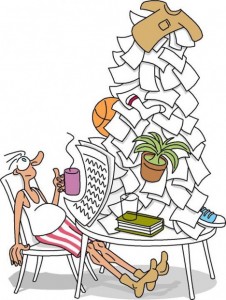 If you could do ONE thing to make 2011 your best year ever, what would it be?
If you could do ONE thing to make 2011 your best year ever, what would it be?
According to three out of every four respondents in a recent Better Homes and Gardens survey, it would consist of “decluttering” their lives. In other words, getting rid of all the stuff that seems important (but really isn’t) so they can focus on what is important.
I heartily agree!
If you read my blog or have heard me give a keynote presentation, you know that I constantly stress the importance of defining what winning looks like for your organization. In fact, the most important task of the leader involves painting a picture of what winning looks like, getting everyone headed in that direction, and keeping them aligned.
But getting clear on winning requires more than just figuring out what you need to do and how you will do it. It also includes getting clear on what you will not do and then making sure those things don’t sap your time, energy, and attention.
When I work with clients on strategic planning, one of the first things we do is a “clearing the plate” exercise. This consists of identifying everything that looks important but does not actually contribute to reaching the destination. In particular, it involves taking an inventory of all the major initiatives and big projects started in the past that no longer fit the organization’s definition of winning.
Most leaders have no trouble identifying these projects. In fact, we seem to know intuitively when a project no longer makes sense because the goals have gotten out of sync with changing market realities. Even so, we often struggle with letting those projects go, for two basic reasons.
The first has to do with Newton’s first law, which states that a body in motion stays in motion unless acted upon by an opposing force. (Does this apply to the business world, or what?) Anyone who has spent any time in management knows that the longer a project hangs around, the more momentum it gains and the harder it is to kill. Even when it becomes clear that the original objectives may no longer be desirable or that the project will never achieve its stated goals, it’s own momentum will often keep it alive long after it should get put to sleep.
The second reason has to do with another of my favorite subjects – thought bubbles, or the things we tells ourselves about what we know to be true in the world. In this case, the more time, energy and money we invest in a particular project, the more numerous and powerful our thought bubbles about why we shouldn’t shut it down.
I’ve already mentioned the #1 thought bubble, “We’ve invested too much time and energy in this, so we can’t stop now.” Here’s what some others might sound like:
- To stop now would be admitting defeat.
- The whole team will look bad if we don’t see this project through.
- We can’t shut this one down; it’s the boss’ pet project.
- If we stop doing this our customers will never forgive us.
The list of thought bubbles could go on and on, but they all have one thing in common. They’re all based on assumptions, attitudes, and beliefs rather than hard data. And the worst thing we can do with any business decision is to make it on outdated ideas and beliefs rather than up-to-date information. So a large part of decluttering involves examining our thought bubbles about what we’re doing and why, and then determining whether our beliefs and assumptions are actually true.
I’m not saying that all ongoing projects should get the axe. Just those that are getting in the way of reaching your destination for 2011. Once you remove them from your line of sight, you’ll be amazed at how much better you can focus on what you need to get done.
The same principle holds true away from the office.
Decluttering our personal lives will go a long way toward helping us achieve any personal goals we may have set for the new year. That means taking a serious look at how we spend our personal time and which activities contribute to achieving our goals and which ones don’t. Then we need to identify and examine the thought bubbles that tell us to hold on to those activities, and determine just how valid they really are.
I propose we make 2011 the official “Year of the Declutter.” Anyone care to join me?






